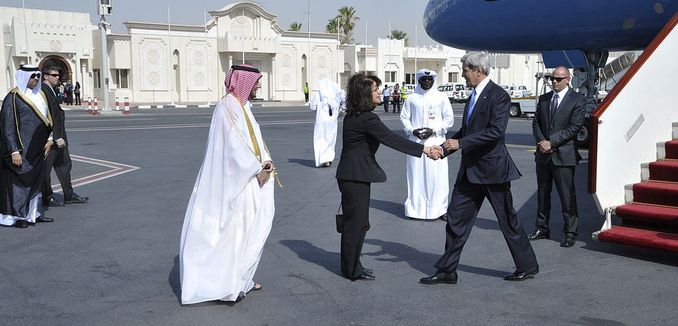Friday night, the Israeli security cabinet unanimously rejected the latest ceasefire proposed by Secretary of State John Kerry. Bizarrely, it is emerging that Kerry’s plan comes in the wake of apparent efforts to appease Hamas’ biggest financial backer, Qatar–which has also been bankrolling some of the most problematic anti-Western elements in the region such as ISIS and the Muslim Brotherhood–as well as Turkey, which has been openly supportive of Hamas’ terror regime and has been viciously attacking Israeli efforts to defend itself. Qatar, it should be noted, has been host to a number of leading terror luminaries, including Hamas leader Khaled Meshaal as well as Muslim Brotherhood cleric Yusuf Al-Qaradawi, who has called for increased ritual circumcision of Muslim girls, and described the Holocaust as Allah’s way of punishing the Jews.
Barak Ravid, diplomatic correspondent for the left-leaning daily, Ha’aretz reported:
The draft Kerry passed to Israel on Friday shocked the cabinet ministers not only because it was the opposite of what Kerry told them less than 24 hours earlier, but mostly because it might as well have been penned by Khaled Meshal. It was everything Hamas could have hoped for.
The document recognized Hamas’ position in the Gaza Strip, promised the organization billions in donation funds and demanded no dismantling of rockets, tunnels or other heavy weaponry at Hamas’ disposal. The document placed Israel and Hamas on the same level, as if the first is not a primary U.S. ally and as if the second isn’t a terror group which overtook part of the Palestinian Authority in a military coup and fired thousands of rockets at Israel.
More pointedly Ravid observes:
The secretary of state’s draft empowered the most radical and problematic elements in the region – Qatar, Turkey, and Hamas – and was a slap on the face to the rapidly forming camp of Egypt, Israel, the Palestinian Authority, Jordan, Saudi Arabia, and the United Arab Emirates, who have many shared interests. What Kerry’s draft spells for the internal Palestinian political arena is even direr: It crowns Hamas and issues Palestinian President Mahmoud Abbas with a death warrant.
The provision that provoked such resistance was this:
Convene in Cairo, at the invitation of Egypt, within 48 hours to negotiate resolution of all issues necessary to achieve a sustainable cease-fire and enduring solution to the crisis in Gaza, including arrangements to secure the opening of crossings, allow the entry of goods and people and ensure the social and economic livelihood of the Palestinian people living in Gaza, transfer funds to Gaza for the payment of salaries for public employees, and address all security issues.
As The Times of Israel explains, “it basically accepts all of Hamas’s demands but addresses Israeli worries only tangentially. Rather than calling for demilitarization of Gaza or addressing the attack tunnels the group has dug, the proposal merely calls for a general discussion of ‘all security issues.’”
The Times of Israel editor, David Horovitz, calls Kerry’s ceasefire initiative a “betrayal.”
What emerges from Kerry’s self-initiated ceasefire mission — Israel had already accepted the Egyptian ceasefire proposal; and nobody asked him to come out on a trip he prefaced with sneering remarks about Israel’s attempted “pinpoint” strikes on Hamas terror targets — is that Jerusalem now regards him as duplicitous and dangerous.
Contrary to his public claim at his press conference in Cairo that his ceasefire proposal was “built on” the Egyptian initiative, it manifestly is nothing of the kind. As indicated by the unconfirmed text reported by Issacharoff, by other subsequent reports of its content, and by the cabinet’s outraged rejection, it is a proposal that, to quote an unnamed official cited by Channel 2, “tunneled under the Egyptian initiative,” a document, to quote from another of those leaked comments, that reads like it was drawn up for or even by Hamas’s Khaled Mashaal.
Both Horovitz and Ravid note that compounding the problems with the proposal itself, Kerry then jetted to Paris to meet with Hamas’ sponsors. In Horovitz’ words:
He met with his counterparts from Turkey, whose Hamas-backing leadership has lately accused Israel of attempting genocide in Gaza and compared Netanyahu to Hitler, and with Qatar, Hamas’s funder in chief, directly accused by president Shimon Peres last week of financing Hamas’s rockets and tunnels. Staggeringly, he did not bring Israel, Egypt, or the PA to his Paris sessions.
Even Jeffrey Goldberg, who has been one of the Obama administration’s most prominent defenders, recognizes how damaging Kerry’s initiative has been.
I’m not sure why Kerry’s proposals for a ceasefire seem to indulge the organization that initiated this current war. Perhaps because Kerry may be listening more to Qatar, which is Hamas’ primary funder, than he is listening to the Jordanians, Emiratis, Saudis, and Egyptians, all of whom oppose Hamas to an equivalent or greater degree than does their ostensible Israeli adversary. In any case, more on this later, as more details emerge about Kerry’s efforts. For purposes of this discussion, I’ll just say that Israel won’t have a chance of winning the current struggle against Hamas’s tunnel-diggers and rocket squads if its principal ally doesn’t appear to fully and publicly understand Hamas’s nihilistic war aims, even as it works to shape more constructive Israeli policies in other, related areas.
Last week Jonathan Schanzer and David Weinberg of the Foundation for Defense of Democracies warned that accepting the Qatar-Turkey ceasefire proposal would be a “huge mistake” and would “reward them for bad behavior.”
[Photo: U.S. Department of State / WikiCommons ]




